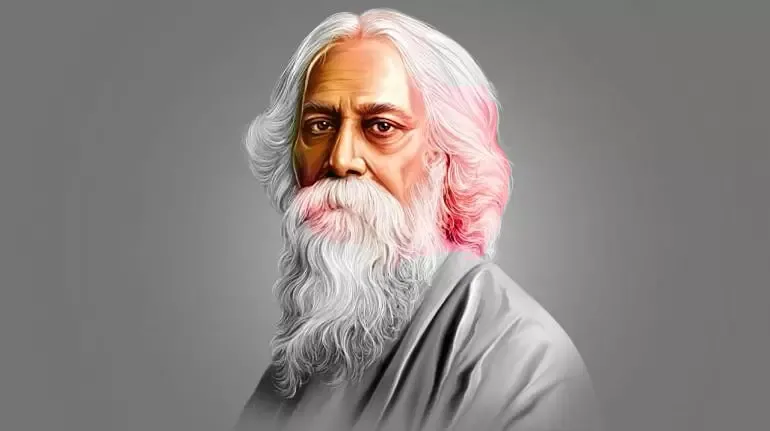In this article, we will know the biography of Rabindranath Tagore and some interesting facts popular about him. Let's start.
Biography of Rabindranath Tagore
Rabindranath Tagore was born on May 7, 1861 at the famous Jor Sanko Bhawan in Calcutta. Your father Debendranath Tagore (Devendranath Thakur) was a leader of the Brahmo Samaj. You were his youngest son. Your family was one of the famous and prosperous families of Kolkata. The national anthem of India is your gift. Rabindranath Tagore was interested in writing poems and stories since childhood. Rabindranath Tagore had a great love for nature. He was a Bengali poet, story writer, lyricist, musician, playwright, essayist and painter. Tagore played a major role in introducing the best of Indian culture to Western countries and introducing India to the culture of Western countries and is generally considered to be an exceptionally creative artist of modern India.
Tagore was very talented since childhood. He was a great poet, story writer, lyricist, musician, playwright, essayist and painter. He did not receive any formal education in art. His early education took place at St. Xavier's School. He went to London with the desire to become a lawyer, but returned from there without completing his studies. After that he took over the responsibility of the house. He had a great love for nature. He believed that students should study in a natural environment. He became famous by the nickname of Gurudev. He is the only poet whose two compositions have become the national anthems of India and Bangladesh. Most of his works are centered on the common man. There is simplicity, uniqueness, and divinity in his creations.
Rabindranath Tagore was also known as Rabindranath Tagore and was more famous as Gurudev. He was a great Indian poet who gave many famous writings to the country. Undoubtedly, he was the greatest poet after Kalidas. Today, he is famous all over the world as one of the greatest poet and writer of all life time. He was born to Maharishi Devendranath Tagore (Father) and Sharada Devi (Mother) in 1861 in a rich and cultured family at Jor-Sanko, Calcutta on 7th May. In 1875, when Tagore was 14 years old, his mother died. At an early age, he developed an interest in writing poetry. He was also a painter, philosopher, patriot, educationist, novelist, singer, essay writer, story writer and creative activist.
When his works were translated into English, then the whole world came to know about his talent. Nature lover Tagore established Shantiniketan in the zenith of trees and plants. Shantiniketan stopped getting government financial support. And its name was put in the black list of the police. And threatening letters were sent to the parents of the students studying there. The British media in a ruthless manner sometimes praised Tagore and sometimes sharply criticized it.
Social life of Rabindranath
The 'Bang-Bhang Movement' started with the Rakshabandhan festival celebrated in Kolkata on 16 October 1905 under the leadership of Rabindranath. This movement started the Swadeshi movement in India. Tagore strongly condemned one of the world's biggest massacres, the Jallianwala massacre (1919) and in protest returned the title of 'Knight Hood' conferred by the British administration. On getting 'Night Hood', 'Sir' is added to the name.
The everlasting connection between man and God emerges in different forms in his creations. There is hardly any branch of literature in which he is not composed - poetry, song, story, novel, drama, management, sculpture - he composed in all genres. Among his published works - Geetanjali, Geetali, Geetimalaya, Katha O Kahani, Shishu, Shishu Bholanath, Kanika, Transitna, Kheya etc. are prominent. He also translated some books into English. After the English translation, his talent spread all over the world.
Tagore composed about 2,230 songs. Rabindra Sangeet is an integral part of Bengali culture. Tagore's music cannot be separated from his literature. Most of his compositions have now been included in his songs. Influenced by the thumri style of Hindustani classical music, these songs present different shades of human emotion. Gurudev's songs in different ragas give an impression as if they were composed for that particular raga. This nature lover, who has a deep love for nature, is the only person who wrote the national anthem for two countries.
Through his writings in the form of poems or story, the mental and moral spirit of the people was well displayed. His writings have proved to be pioneering and revolutionary for today's people as well. He was deeply saddened by the tragedy of the Jallianwala Bagh massacre in which many innocent people including women and children were killed by General Dyer and his soldiers in Amritsar on 13 April 1919.
In 1901, Tagore established an experimental school at Shantiniketan in the rural area of West Bengal with only five students. His own son was also included in these five people. At present, about six thousand students study in Visva-Bharati, which got the status of a national university in 1921. Around this Shantiniketan was settled. Where he tried to combine the best of Indian and Western traditions. Shantiniketan founded by him is recognized as a model university in the whole country in the field of education of literature, music and art. Many geniuses like Indira Gandhi have received education from Shantiniketan.
After his return from England and his marriage to 1901, Rabindranath spent most of his time in his family's fiefdom in Sealdah (now in Bangladesh). In the year 1898, his children and wife also started living with him here. He traveled far and wide in his fiefdom and closely observed the life of the rural and poor people. From 1891 to 1895, he wrote several short stories set in rural Bengal.
In the year 1901, Rabindranath moved to Shantiniketan. He wanted to establish an ashram here. Here he built a school, library and place of worship. He planted many trees here and also made a beautiful garden. It was here that his wife and two children also died. His father also passed away in 1905. By this time, he was also earning a monthly income from his inherited wealth.
Some income also started coming from the royalties of his literature. In 1921, he, along with agricultural economist Leonard Amherst, founded the Institute for Rural Reconstruction near his ashram. Later its name was changed to Sriniketan. Rabindranath Tagore was also known as Gurudev. The national anthem of India, Jana Gana Mana and the national anthem of Bengal, Amar Sonar Bangla was composed by Rabindranath Tagore. Shantiniketan was founded by Rabindranath Tagore.
Rabindranath Tagore was given the title of Sir but he returned the title of Sir after the Jallianwalabagh massacre. He was also awarded the Nobel Prize for Literature in the year 1913 for Rabindranath Tagore's poetic composition Gitanjali. Rabindranath Tagore was Asia's first Nobel Prize winner. Gurudev started painting in his last days.
In 1913, the Dr. Alfred Nobel Foundation awarded the Nobel Prize for Literature to Rabindranath Tagore's collection of poems 'Gitanjali'. The glory of Rabindranath was spread all over the world after receiving the Nobel Prize. Soon 'Gitanjali' was translated into various foreign and Indian languages. The main theme of the poems in Gitanjali is devotion to God, expressed by Rabindranath in very soft words and innovative method.
Seeing the work of Rabindranath in various fields, the British government gave him the title of 'Sir' in 1915. But Rabindranath was not grateful to the British government with this title. In 1919 at Jallianwala Bagh in Punjab, when the British government shot and killed thousands of innocent Indians, Rabindranath was enraged, he renounced the title 'Sir'.
Rabindranath had traveled abroad a total of eleven times, due to which he was introduced to eminent English litterateurs. With his encouragement, Rabindranath had published English translations of some of his songs and poems. These works were published under the title "Gitanjali". Rabindranath Tagore Rabindranath got the Nobel Prize on this, which is the highest award in the world.
On August 7, 1941, on the day of Rakhi, this great poet closed his eyes, but even today the whole country sings his national anthem with respect. The period from 1903 to 1907 was difficult for him, but due to academic and social work, he did not allow any hindrance in his literary work.
The composition of poems, songs, novels, plays and stories continued continuously. The songs of Gitanjali and today's national song "Jana Gun Mana" were also composed in those days.
Books of Rabindranath Tagore
- Gaura
- Gitanjali
- Post office
- The Gardner
- Clerk
- The Golden Boat etc.









If you liked the information of this article, then please share your experience by commenting. This is very helpful for us and other readers. Thank you